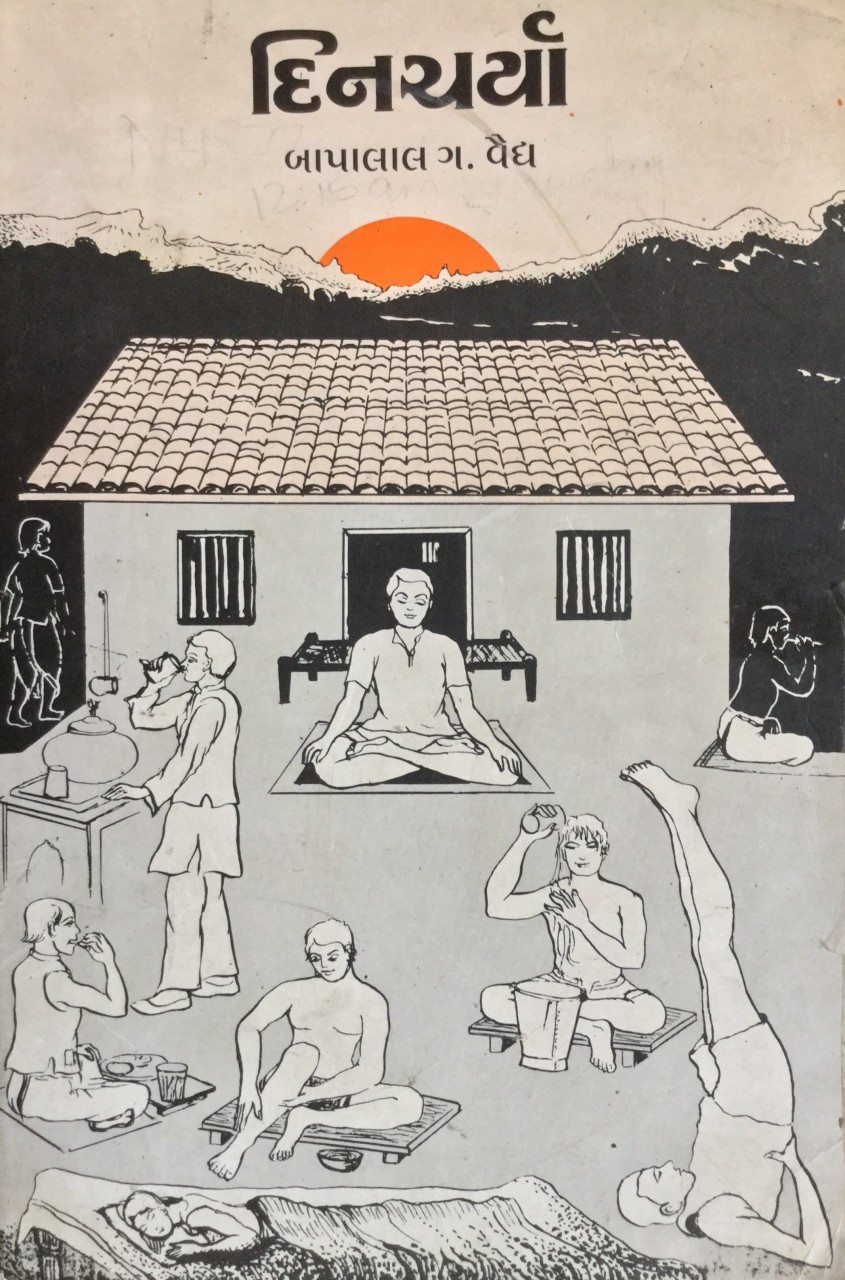Dinacharya=Din(day)-acharya(conduct): Dinacharya: Daily Routine for healthy body and mind
The ideal lifestyle for each day is called dinacharya. A lifetime of fitness requires daily fitness to be practiced on a day to day basis, for which a daily routine of practices is essential. Daily regimen is divided into daytime(dinacharya) and night(ratricharya)time routine.A general routine would begin with waking up at least 96 minutes prior to sunrise in the Brahm Muhurt/Amrit bela when the divine universal energy flows. From 2am to 6 am(in this case, sunrise will be @ 6 am) vata-airy energy pervades the body and it is a good time to cleanse the body channels.
Ushapan: begin the day with at least two glasses of water, preferably stored in a copper vessel overnight and kept at the bedside for easy reach as you wake up. Notice how every alternate health care professional will enquire about bowel health? This drinking of water first thing in the morning helps in bowel movement and the evacuation of the bowels is an important factor in maintaining health. This is followed by washing of hands, feet and face and most importantly, the mouth. Oral cavity cleansing is done by thorough(not strong) tongue scraping, brushing of teeth and by oil pulling, gandusha. If there is no suitable oil, even warm water works fine. Washing of eyes and Neti, nasal irrigation help with eye related and sinus problems. Nasal and ear drops as medicated or non medicated oil should then be instilled and some time can be spent oiling the body(abhyanga). This is usually the point that the body turns towards energetic quietness which can be experienced and enhanced by a simple slow asana practice. Asana or other light exercise is to be followed by herbal tea or herbal smoke(clears & strengthens the lungs) for relaxed reflection. Waking up the body again is then accomplished with a bath, preferably using non-chemical ubtan(herbal bath powder).
All these practices of morning are created to cleanse the channels and open the senses to welcome and celebrate the new day ahead.
Gandusha, teeth tongue cleaning-sense of taste, Rasa:element-water
Neti, Nasya: Nose: sense of smell, Gandha: element-earth
Eye wash: Eyes: sense of sight, Roopa: element-fire
KarnaTarpana: Ears: sense of hearing, Shabd: element-ether
Abhyanga: Skin: sense of touch: Sparsha: element-air
Asana, Pranayama and meditation act upon the mind to lead to a soul experience.
Neti, Nasya: Nose: sense of smell, Gandha: element-earth
Eye wash: Eyes: sense of sight, Roopa: element-fire
KarnaTarpana: Ears: sense of hearing, Shabd: element-ether
Abhyanga: Skin: sense of touch: Sparsha: element-air
Asana, Pranayama and meditation act upon the mind to lead to a soul experience.
Post bath: This would usually coincide with the time for sunrise. After dressing appropriately as per season and anointing with specific herbs, one may do a simple meditation by offering water to the rising Sun(ideally within the first 40 minutes) while gazing at the refraction of rays in the top of the water stream. If you're the more spiritual practice types, you can meditate at your personal altar with a lamp to gaze upon(sense of sight) while fragrant dhoop(incense) enhances the sense of smell, the sense of sound aligning to the tinkling of a bell or the Om of the conch, the sense of taste indulged with the offering of naivedya(the five nectars) and imbibed as Prasad; the sense of touch felt as the palms are folded together in prayer. Meditation as Japa(chant on rosary)can also to be practiced. Interestingly, the traditional Brahmin prayer ritual includes pranayama, mudras and address of body chakras and energy points too.
The purpose of thoroughly cleansing all these physical sense organ orifices is to reach the elementary level of the body towards an experience of the subtle body and thus open up the channels that the Prana-vital life force flows through. These orifices, especially the ones that contain the five sense organs are located on the face itself: they are connected to the brain and nerves as Nadis and relevant chakras: plexuses. To oil these also has a specific purpose. These subtle channels, when maintained supple are responsible for healthy physical and mental wellness. Charaka, the great Ayurvedic master himself compares abhyanga oiling to the oiling of leather, clay pots and the spokes of a cartwheel. Much like a well oiled machine runs better, pretty much literally oiled body channels also bode well for a long run of life, which is desired so as to arrive at the truth of the soul through the myriad of life's experiences. Also, these routine practices serve to act as a rock of Gibraltar through the storms of everyday life and help one to understand,experience and arrive to establish the connection of the physical to the subtle. This itself is yoga in action, while breathing and living it through daily routine existence. Self care is a way of self love and this is a prerequisite to know love from outside the self. Yoga is not separate from routine life, even shopping for groceries while handling screaming demanding kids and cleaning up the house is all yoga when it is done in the spirit of dedication of all action to the divine, which is within you itself. This self care and yoga through everyday routine goes beyond time and is integrted into the tradition of India. The seamless weave of Ayurveda, yoga Asana & pranayama, astrological in/confluence, the very natural lifestyle: all create various patterns on the loom as per locations.
Ancient lifestyle was much different from what we have today. Yet, we can include at least some of the basic routines that our ancestors used. Some practices do not have to be done daily, eg abhyanga can be once a week even. Some practices are encouraged as per season and time..for eg. at the monsoon season, abhyanga is encouraged to pacify the rising vata element in the body.
There are a few more routines to learn about to apply through the day and evening before bedtime....all at the YogaVedic Retreat and workshop
The purpose of thoroughly cleansing all these physical sense organ orifices is to reach the elementary level of the body towards an experience of the subtle body and thus open up the channels that the Prana-vital life force flows through. These orifices, especially the ones that contain the five sense organs are located on the face itself: they are connected to the brain and nerves as Nadis and relevant chakras: plexuses. To oil these also has a specific purpose. These subtle channels, when maintained supple are responsible for healthy physical and mental wellness. Charaka, the great Ayurvedic master himself compares abhyanga oiling to the oiling of leather, clay pots and the spokes of a cartwheel. Much like a well oiled machine runs better, pretty much literally oiled body channels also bode well for a long run of life, which is desired so as to arrive at the truth of the soul through the myriad of life's experiences. Also, these routine practices serve to act as a rock of Gibraltar through the storms of everyday life and help one to understand,experience and arrive to establish the connection of the physical to the subtle. This itself is yoga in action, while breathing and living it through daily routine existence. Self care is a way of self love and this is a prerequisite to know love from outside the self. Yoga is not separate from routine life, even shopping for groceries while handling screaming demanding kids and cleaning up the house is all yoga when it is done in the spirit of dedication of all action to the divine, which is within you itself. This self care and yoga through everyday routine goes beyond time and is integrted into the tradition of India. The seamless weave of Ayurveda, yoga Asana & pranayama, astrological in/confluence, the very natural lifestyle: all create various patterns on the loom as per locations.
Ancient lifestyle was much different from what we have today. Yet, we can include at least some of the basic routines that our ancestors used. Some practices do not have to be done daily, eg abhyanga can be once a week even. Some practices are encouraged as per season and time..for eg. at the monsoon season, abhyanga is encouraged to pacify the rising vata element in the body.
There are a few more routines to learn about to apply through the day and evening before bedtime....all at the YogaVedic Retreat and workshop
This post cover is of the book Dinacharya written by the esteemed Ayurvedacharya Bapalal G. Vaidya who was from a family lineage of vaidyas and a Gandhian who advocated natural living. It is this book that has helped me immensely understand the basics of the Indian traditions of living a YogaVedic lifestyle.



